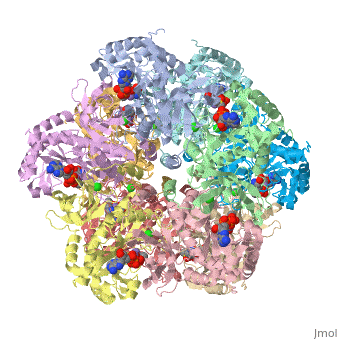User:Kay Owosela
From Proteopedia
(→Stoichiometry) |
(→Stoichiometry) |
||
| Line 20: | Line 20: | ||
= Stoichiometry = | = Stoichiometry = | ||
The stoichiometry of Glutamine Synthetase is as follows: | The stoichiometry of Glutamine Synthetase is as follows: | ||
| - | Glutamate + | + | Glutamate + NHз + ATP --> Glutamine + ADP + Pi + H+ |
In this reaction, Glutamate is used as a major reactant and ATP is used for energy to form Glutamine. It should be noted that along with the enzyme, Me+ which can be either manganese or magnesium is used as a catalyst. | In this reaction, Glutamate is used as a major reactant and ATP is used for energy to form Glutamine. It should be noted that along with the enzyme, Me+ which can be either manganese or magnesium is used as a catalyst. | ||
This is however, a 2-step reaction. In the first step of this reaction, an intermediate Υ-glutamyl phosphate is formed. The formation of the intermediate is done by phosphoryl transfer an ATP group Y-carboxylate group of glutamate. In the second step of this reaction, NH4+ attacks the activated intermediate to release the phosphate group yielding Glutamine. | This is however, a 2-step reaction. In the first step of this reaction, an intermediate Υ-glutamyl phosphate is formed. The formation of the intermediate is done by phosphoryl transfer an ATP group Y-carboxylate group of glutamate. In the second step of this reaction, NH4+ attacks the activated intermediate to release the phosphate group yielding Glutamine. | ||
| - | |||
= Quarternary Structure Polymerization = | = Quarternary Structure Polymerization = | ||
Revision as of 03:30, 8 December 2008
Biol 430 Biology Major Partners: Delo Sarr, Mustapha Hussain
|
Contents |
Jmol practice
Backbone with ligand
Labeled Ligands in Chain A
Active Site with Amino Acid Residues
Connection between Chain F residue 63 and Chain G residue 319
Stoichiometry
The stoichiometry of Glutamine Synthetase is as follows: Glutamate + NHз + ATP --> Glutamine + ADP + Pi + H+
In this reaction, Glutamate is used as a major reactant and ATP is used for energy to form Glutamine. It should be noted that along with the enzyme, Me+ which can be either manganese or magnesium is used as a catalyst.
This is however, a 2-step reaction. In the first step of this reaction, an intermediate Υ-glutamyl phosphate is formed. The formation of the intermediate is done by phosphoryl transfer an ATP group Y-carboxylate group of glutamate. In the second step of this reaction, NH4+ attacks the activated intermediate to release the phosphate group yielding Glutamine.
Quarternary Structure Polymerization
(Insert Text Here)
Active Site
(Insert Text Here)
Glutamine Synthetase Symmetry

